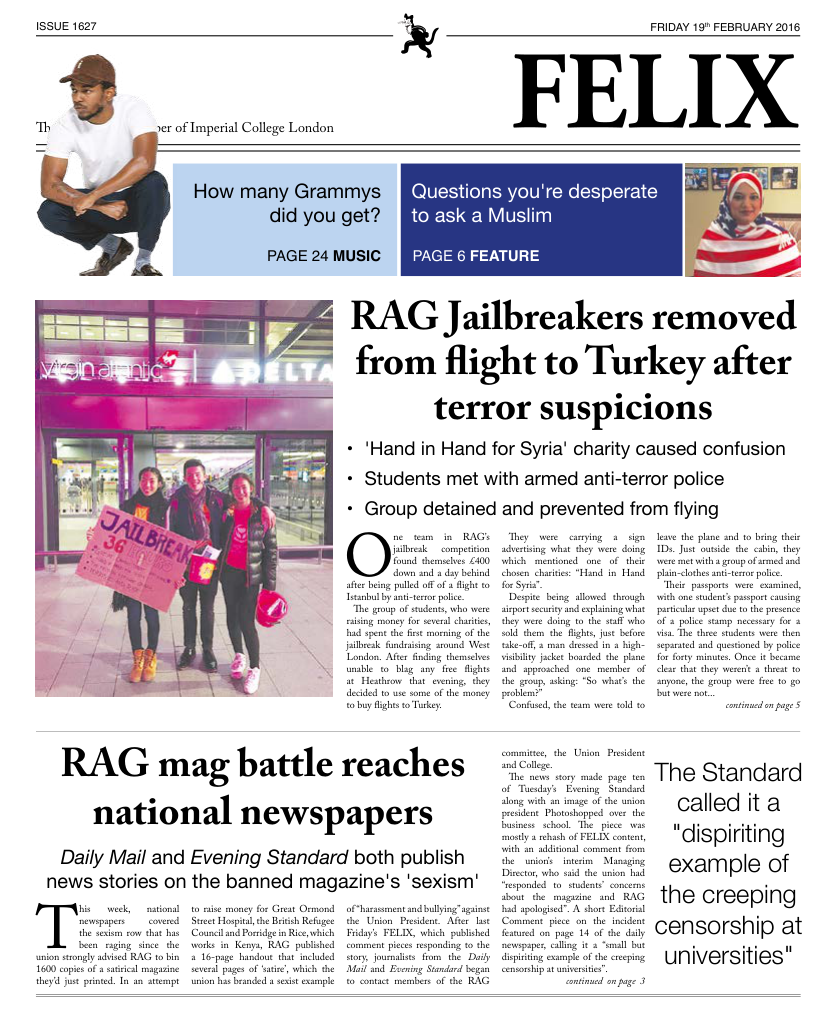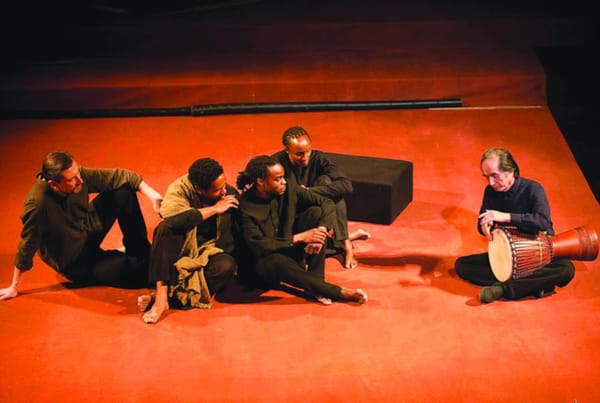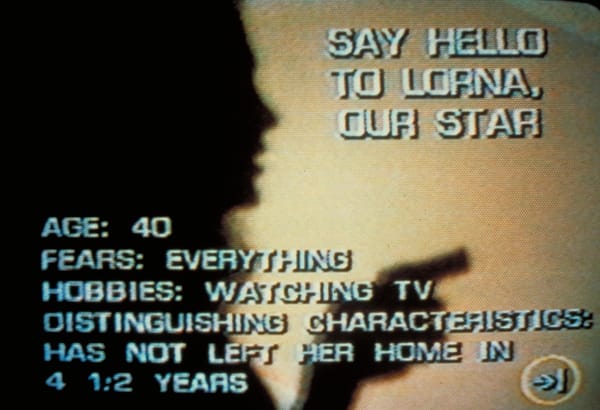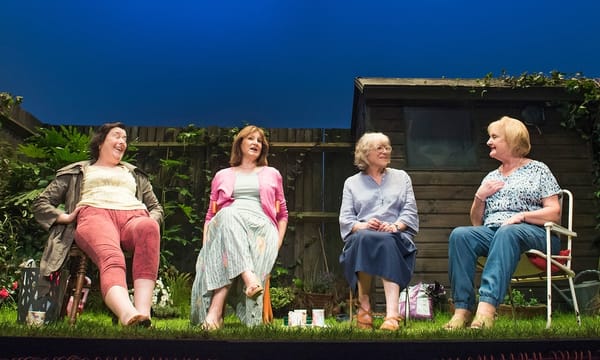“Theatre isn’t just one thing”
FELIX asks Gate Theatre’s new director Ben Kidd about directing and his latest work
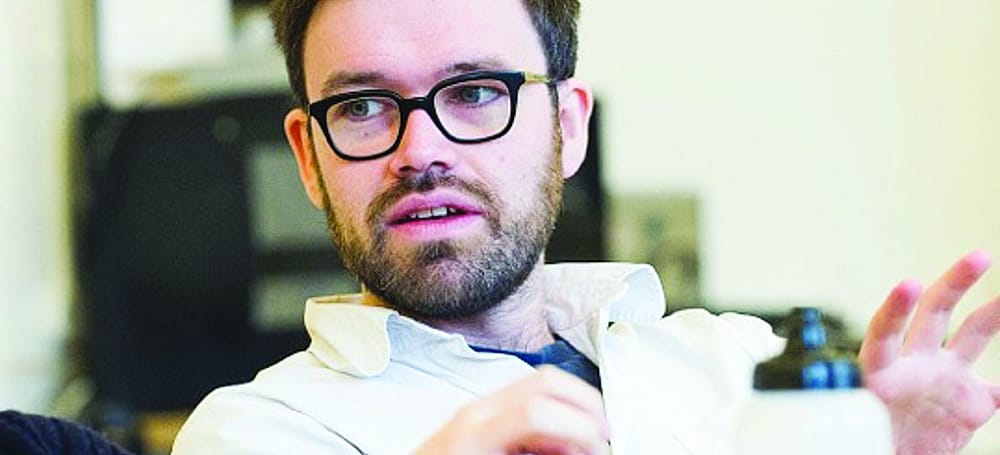
Ben Kidd bounds into a Notting Hill basement in between a kebab shop and a pizzeria. For the first time, Gate publicity maestro Tash Brown looks a tad worried. She needn’t be. Gate’s work is exactly the kind of thing I wish we had more of here at Imperial. Passionately done and served up with a massive dollop of generosity on the side, Gate Theatre is one big cosy theatre family – and y’all are invited. (Check out its outreach programme!) Kidd, fresh from rehearsals, bubbles with the same outspoken friendliness, and we sit down to talk Ireland, Imperial and art.
FELIX: After working with the Young Vic, and now here at The Gate, are you starting to feel more part of the furniture in London?
BK: [Laughs] I don’t think anyone feels part of the furniture in London – it’s too big!
FELIX: Is it more bread and butter in London and fun in Dublin? How does your work with DeadCentre fit in?
BK: London is much more of a bubble. It’s commerical. Directors learn to get 4-star reviews from the Guardian, and Simon Stephens is Simon Stephens because of West End transfers [Laughs]. There’s no such thing as famous people in Dublin. It’s a lot more informal, more like a family, more “What are you going to f*** up next?” The most important people will just pop along to your show. Here, it’s hierarchical. There are more stakeholders, and you get a lot more feedback – someone (normally a well educated white man) who’ll say “Well done, you’re clever enough”. But that’s a huge support, in the sense that you have someone there legitimising what you do.
FELIX: This is your first play at the Gate, and an international premiere, too. What made you pick up this script?
BK: Actually, it was the other way around! This is my first time directing something at the Gate... I’d tried (unsuccessfully) to apply for a number of things, and got rejected. As a director, it’s a dream when someone rings you up – that never happens! I don’t actually know how many Nina [Nina Segal, In the Night Time playwright] and Chris [Christopher Haydon, Artistic Director at The Gate] interviewed, but I think they had me in mind when they were thinking of putting on the play.
FELIX: A friend of mine saw it and compared it to lyrics. To me it reads like a kind of epic poem. It’s one big stream of consciousness, and there isn’t a single stage direction in the whole piece. How hard has it been to get that sense of flow across, and keep up some tension?
BK: It’s a hard play. My first question when I read the script was “Why isn’t this a short story?” It’s definitely a very langauge-focused play. I don’t really do ‘creeping tension’ or anything like that. I think there’s a million different ways you can direct things. There’s not necessarily one set way, I just try to be explorative and flexible. A director should generate ideas – you can have a rough feel of how it should be but you need to be open to the idea that something might have to change. For me, the set design, the production is very important. I can have five or six competing ideas – the set is the thing that has final choice – when it has to become an actual, physical thing.
FELIX: How important has it been to have that link with the writer [Nina Segal]?
BK: That’s a very important relationship. Nina is just starting out and she has a whole wonderful career of writing ahead of her. You see she’s very discreet – I think even if she thought we were f***king it up she wouldn’t say. She’s confident enough in her writing to trust us, and that someone will get it right, eventually!
FELIX: How difficult was the casting? I mean, the minute I read the script, I immediately thought that you need someone who’s going through this... [Just having kids]
BK: [Laughs] It’s bizarre to think how we would have made the play without someone in the production having kids. I don’t have kids, no one at the Gate has kids... If Alex [Alex Waldmann, ‘Man’] hadn’t had kids I don’t know what we’d have done! We cast it as naturally as possible. These are two people who could believably be the people in the script.... above all, I think you cast talent, and you cast people who are interested in the role.
FELIX: So, the curtain comes down on the first night. How am I changed?
BK: I don’t know... hopefully you’ll laugh and cry and think differently about the universe. It’s about creating a space for someone to have an emotional journey. ([Laughs] “They better f**cking cry!”) I don’t think people will come away and want to be this or that. No one cares what a play is about – they care what a play’s going to be like.
FELIX: What drives you as a director?
BK: I want to get to the point where you can see it again and get that same feeling you felt when you first saw it. I want to introduce an audience to that thrill that I had in my head.
FELIX: Let’s say that science is essentially about trying to make sense of the world. Isn’t that what art’s for? Why is there such a big gulf between the two?
BK: There’s this cultural cringe. It’s quite easy I think for a scientist to come to the theatre, to go to a gallery. It’s not easy for someone on the arts side to go the other way around. This idea of the Renaissance man has been lost; we’re all specialists – and that’s a shame. But some people would disagree with you. Perhaps the point of art is to say that the world mostly doesn’t make sense. Art tries to dance around the gaps where we don’t know – it’s about God and death. I reckon as a scientist, the only reason you get out of bed in the morning is that you have the belief that there’s this idea of progress. What if there is no endpoint?
FELIX: So you wouldn’t try to bridge those gaps? It’s not nature that made these boundaries...
BK: I suppose there isn’t a difference between Chemistry and emotions. I definitely wouldn’t support the idea of forcing all physicists to do ballet. But some of the things we’re doing with DeadCentre are trying to challenge the way that the audience interacts with the theatre. It’s not just a case of come in, sit down, watch something. For example, there’s one show we’re doing where the audience has headphones and can hear a directors commentary on the show, while the show is happening. We’re trying to make it more of a conversation with the audience.
FELIX: What advice would you give someone trying to get involved in directing?
BK: Do all the things I didn’t do! I kind of just fell into everything, fell into ‘stuff’. I came late (after trying to be an actor), and I was jaded, worried “I was too old for this”. Develop your taste, see as much theatre as possible. Talk to as many people as possible. Don’t be afraid of knocking on doors (or some public school boy will get there before you). Above all, don’t get obsessed on fixed paths – theatre isn’t just one thing.

